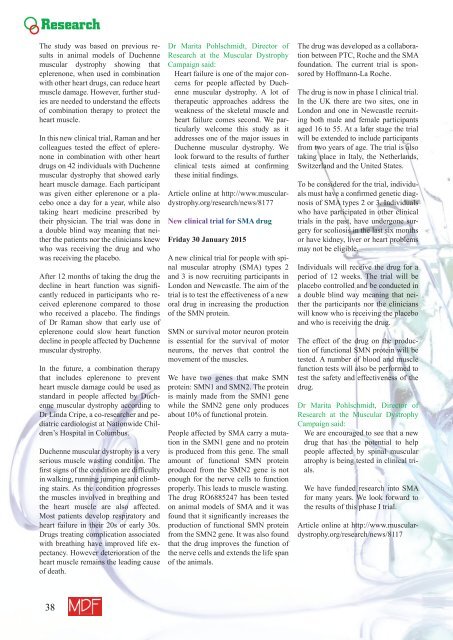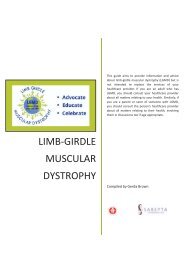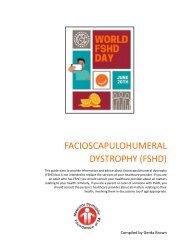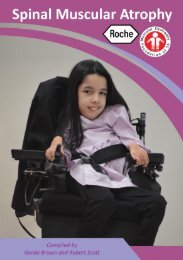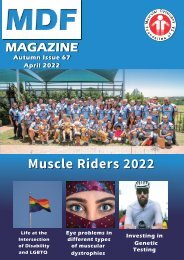MDF Newsletter Content Issue 46 April 2015
Create successful ePaper yourself
Turn your PDF publications into a flip-book with our unique Google optimized e-Paper software.
Research<br />
The study was based on previous results<br />
in animal models of Duchenne<br />
muscular dystrophy showing that<br />
eplerenone, when used in combination<br />
with other heart drugs, can reduce heart<br />
muscle damage. However, further studies<br />
are needed to understand the effects<br />
of combination therapy to protect the<br />
heart muscle.<br />
In this new clinical trial, Raman and her<br />
colleagues tested the effect of eplerenone<br />
in combination with other heart<br />
drugs on 42 individuals with Duchenne<br />
muscular dystrophy that showed early<br />
heart muscle damage. Each participant<br />
was given either eplerenone or a placebo<br />
once a day for a year, while also<br />
taking heart medicine prescribed by<br />
their physician. The trial was done in<br />
a double blind way meaning that neither<br />
the patients nor the clinicians knew<br />
who was receiving the drug and who<br />
was receiving the placebo.<br />
After 12 months of taking the drug the<br />
decline in heart function was significantly<br />
reduced in participants who received<br />
eplerenone compared to those<br />
who received a placebo. The findings<br />
of Dr Raman show that early use of<br />
eplerenone could slow heart function<br />
decline in people affected by Duchenne<br />
muscular dystrophy.<br />
In the future, a combination therapy<br />
that includes eplerenone to prevent<br />
heart muscle damage could be used as<br />
standard in people affected by Duchenne<br />
muscular dystrophy according to<br />
Dr Linda Cripe, a co-researcher and pediatric<br />
cardiologist at Nationwide Children’s<br />
Hospital in Columbus.<br />
Duchenne muscular dystrophy is a very<br />
serious muscle wasting condition. The<br />
first signs of the condition are difficulty<br />
in walking, running jumping and climbing<br />
stairs. As the condition progresses<br />
the muscles involved in breathing and<br />
the heart muscle are also affected.<br />
Most patients develop respiratory and<br />
heart failure in their 20s or early 30s.<br />
Drugs treating complication associated<br />
with breathing have improved life expectancy.<br />
However deterioration of the<br />
heart muscle remains the leading cause<br />
of death.<br />
Dr Marita Pohlschmidt, Director of<br />
Research at the Muscular Dystrophy<br />
Campaign said:<br />
Heart failure is one of the major concerns<br />
for people affected by Duchenne<br />
muscular dystrophy. A lot of<br />
therapeutic approaches address the<br />
weakness of the skeletal muscle and<br />
heart failure comes second. We particularly<br />
welcome this study as it<br />
addresses one of the major issues in<br />
Duchenne muscular dystrophy. We<br />
look forward to the results of further<br />
clinical tests aimed at confirming<br />
these initial findings.<br />
Article online at http://www.musculardystrophy.org/research/news/8177<br />
New clinical trial for SMA drug<br />
Friday 30 January <strong>2015</strong><br />
A new clinical trial for people with spinal<br />
muscular atrophy (SMA) types 2<br />
and 3 is now recruiting participants in<br />
London and Newcastle. The aim of the<br />
trial is to test the effectiveness of a new<br />
oral drug in increasing the production<br />
of the SMN protein.<br />
SMN or survival motor neuron protein<br />
is essential for the survival of motor<br />
neurons, the nerves that control the<br />
movement of the muscles.<br />
We have two genes that make SMN<br />
protein: SMN1 and SMN2. The protein<br />
is mainly made from the SMN1 gene<br />
while the SMN2 gene only produces<br />
about 10% of functional protein.<br />
People affected by SMA carry a mutation<br />
in the SMN1 gene and no protein<br />
is produced from this gene. The small<br />
amount of functional SMN protein<br />
produced from the SMN2 gene is not<br />
enough for the nerve cells to function<br />
properly. This leads to muscle wasting.<br />
The drug RO6885247 has been tested<br />
on animal models of SMA and it was<br />
found that it significantly increases the<br />
production of functional SMN protein<br />
from the SMN2 gene. It was also found<br />
that the drug improves the function of<br />
the nerve cells and extends the life span<br />
of the animals.<br />
The drug was developed as a collaboration<br />
between PTC, Roche and the SMA<br />
foundation. The current trial is sponsored<br />
by Hoffmann-La Roche.<br />
The drug is now in phase I clinical trial.<br />
In the UK there are two sites, one in<br />
London and one in Newcastle recruiting<br />
both male and female participants<br />
aged 16 to 55. At a later stage the trial<br />
will be extended to include participants<br />
from two years of age. The trial is also<br />
taking place in Italy, the Netherlands,<br />
Switzerland and the United States.<br />
To be considered for the trial, individuals<br />
must have a confirmed genetic diagnosis<br />
of SMA types 2 or 3. Individuals<br />
who have participated in other clinical<br />
trials in the past, have undergone surgery<br />
for scoliosis in the last six months<br />
or have kidney, liver or heart problems<br />
may not be eligible.<br />
Individuals will receive the drug for a<br />
period of 12 weeks. The trial will be<br />
placebo controlled and be conducted in<br />
a double blind way meaning that neither<br />
the participants nor the clinicians<br />
will know who is receiving the placebo<br />
and who is receiving the drug.<br />
The effect of the drug on the production<br />
of functional SMN protein will be<br />
tested. A number of blood and muscle<br />
function tests will also be performed to<br />
test the safety and effectiveness of the<br />
drug.<br />
Dr Marita Pohlschmidt, Director of<br />
Research at the Muscular Dystrophy<br />
Campaign said:<br />
We are encouraged to see that a new<br />
drug that has the potential to help<br />
people affected by spinal muscular<br />
atrophy is being tested in clinical trials.<br />
We have funded research into SMA<br />
for many years. We look forward to<br />
the results of this phase I trial.<br />
Article online at http://www.musculardystrophy.org/research/news/8117<br />
38


